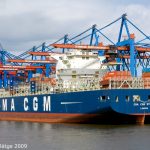Is It Time to Change or Replace Ocean Shipping Reform Act?
 Now that international shipping is dominated by three carrier alliances, the 2M, OCEAN Alliance, and THE Alliance, many shippers are worried about freight rate collusion between the shipping lines in these alliances.
Now that international shipping is dominated by three carrier alliances, the 2M, OCEAN Alliance, and THE Alliance, many shippers are worried about freight rate collusion between the shipping lines in these alliances.
Shippers are not alone. Members of Congress and the Department of Justice (DOJ) are also suspicious of aligned carriers taking part in antitrust activities.
In fact, the DOJ made a bold move back in March, when it subpoenaed CEOs of major container lines.
The Journal of Commerce (JOC) reported at the time:
US antitrust investigators last week raided the biannual Box Club meeting in San Francisco, handing subpoenas to the CEOs of major container lines and capitalizing on a rare window to exercise their power over non-US-based companies.
While there have been many price fixing investigations into carriers in recent years, the exact reason for these subpoenas is still not clear two months later. What is clear is the DOJ’s suspicion of antitrust activities between shipping lines.
Last year, the DOJ’s then Acting Assistant Attorney General Renata B. Hesse wrote a letter to the Federal Maritime Commission (FMC) about concerns over the concentration of the international shipping industry into only three major shipping alliances likely facilitating “coordination in an industry that is already prone to collusion”. Hesse even gave instances of that collusion, writing:
For example, four companies (three of which are slated to join THE Alliance) have pled guilty, and eight corporate executives have been indicted or pled guilty in connection with a worldwide conspiracy involving price fixing, bid-rigging, and market allocation among providers of roll-on, roll-off shipping.
Unfortunately for the DOJ, its power to go after carriers regarding antitrust activity is somewhat limited. The U.S. Ocean Shipping Reform Act of 1998 actually gives carriers some ability to cooperate on pricing, giving the shipping lines with FMC approved agreements limited antitrust immunity to discuss and agree on rate guidelines. Those rate guidelines would be voluntary, and the DOJ could go after shipping lines that went beyond this antitrust immunity.
However, many find it alarming that carriers could have any immunity to federal antitrust laws at all.
The idea in giving some immunity to the shipping lines was to allow the FMC, with more expertise on the international shipping industry, to regulate carriers and protect shippers, as well as the general public, when it comes to this industry. But has the Ocean Shipping Reform Act created an antitrust loophole that carriers are taking advantage of?
There are members of Congress who certainly think carrier alliances are cooperating on more than just ship operations, as is supposed to be the case with these carrier alliance vessel operating agreements.
In an American Shipper article by Chris Dupin, Rep. Peter DeFazio, D-Ore., the ranking member of the House Transportation & Infrastructure Committee was quoted as saying:
“The Box Club, who were all just subpoenaed, what were they doing?” he asked. “There is no one in the industry who thinks these people aren’t getting together in the room and colluding over pricing and who is going to control what harbors and what marine facilities, what they are going to do.
“It’s Pollyannaish to think these alliances are just going to just help make the industry more efficient. Twenty years ago, that might have been true. It’s not true today, and they are foreign controlled.”
…
“We need to revisit the Act, we need to revisit the assumptions that we are creating efficiencies and market forces here in these modern times, where we know state-owned enterprises and governments that are acting in a mercantilist way are not really interested in competition and they are interested in driving down their costs and dominating our markets and put- ting our people at disadvantage.”
DeFazio is not alone. Dupin’s article goes on to quote Rep. Duncan Hunter, R-Calif., as suggesting:
“An idea would be to maybe strip out the limited antitrust exemption that FMC can grant these consortiums totally, so they are not allowed to join together to put pressure on the ports, collude on price.”
The DOJ certainly thinks it’s time to do away with the portion of the Ocean Shipping Reform Act that makes carriers exempt from federal antitrust laws.
In another letter from Hesse to the FMC, she wrote, “The Department has long taken the position that the general antitrust exemption for international ocean shipping carrier agreements is no longer justified.”
The letter goes on to say:
The passage of the Ocean Shipping Reform Act in 1998 was a step towards deregulation, but the industry still lacks the full benefits of competition. The ocean shipping industry exhibits no extraordinary characteristics that warrant departure from competition policy. Price fixing and other anticompetitive practices by the industry over the years have imposed substantial costs on our economy through higher prices on a wide variety of goods shipped by ocean transportation.
So what do you think? Is it time to amend or replace the Ocean Shipping Reform Act to remove the exemption shipping lines with FMC approved agreements enjoy? Or would that just bring an extra layer of regulation to an already complex industry?
Let us know your thoughts in the comments section below.





A lot is involved here and one has to connect the dots on realities vs. hypothetical, and throw in some factual history.
Start with factual history; the ocean carrier industry had virtual global price fixing authority from governments
around the world for decades, so the FMC “allowing” the limited activities in today’s Agreements is a dramatic
reduction in what was fact for decades.
Why would the ability to collude be enhanced by only three Alliances existing? Four was too may for them to collude?
Back to facts, the last 6 years the container industry has lost Billions, so apparently collusion hasn’t existed, or if it
did, it didn’t work. Can the carriers collude? of course, but the number of Alliances have nothing to do with it.
The complaints today are not from shippers on price fixing, they are from tug operators who fear that the Alliances
will use their combined buying power to drive down and keep prices on tug operations down. A justified fear? maybe,
Is that reason to seek legislation? to do what? eliminate the ability for Alliances to gang up on tug boat operators? or
eliminate Alliances,period? Would either of those actions guarantee there will be no collusion? and folks, wake up, if
you want to see services deteriorate more, more carriers leave the industry, fewer services overall – eliminate Alliances.
How many carriers could be global? – 5 at most and realistically 3. Is that what BCO’s need? .
.
Thanks for the great comment, as always, Gary. Opportunity for collusion certainly doesn’t suddenly appear because there are three alliances instead of four. The fear people have of collusion within the alliances isn’t new with the latest reshuffle. I was hearing rumblings of it back when Maersk, MSC, and CMA CGM were planning the P3 Network and it’s only intensified as carriers alliances have grown in dominance. Collusion has certainly existed in the last 6 years, but where we’ve really seen it is in the RO-RO market. That’s where carriers have been found guilty of price fixing several times in the last few years. On the container side, there have been price wars, and, you’re right, if there have been attempts at price fixing there, it has failed miserably. Unless some of the carriers at the top were intentionally pushing freight rates way down to drive out some of the competition. The issue of Alliances ganging up through group negotiation against the tug boat operators (and port operators too) is an issue that the FMC is addressing. I’m with you in that I don’t think eliminating carrier alliances is an option. Right now they seem necessary for the carriers to cut down costs and get back to be profitable.
Jared, in general agreement with yours. If Alliances go away, so will some more carriers. They are being kept alive by
the alliances. I point again to what happens if Alliances go away, how many carriers can provide anything that
looks like a global presence? 3. Talk about loosing choices, alternatives, port calls, frequency – try 3 global carriers and lose
just one or two more of the “top 15” and serious deterioration of services occurs.
Your last point, cutting costs to be profitable, they have passed that stage. Yes they should be efficient as possible, that is what the
big ships are all about. But if rates don’t go up then a huge problem remains. In the Transpacific, even with the increased rates in new
Service Contracts, round trip revenues port to port of under $1100./40′ still exists. Empty re-positioning costs are over $1. Billion. Those numbers
can’t be sustained even by the most efficient. The terminal costs alone (on in Asia, off on West Coast, on on West Coast off in Asia) are now
approaching $1000. in some lanes and over $850. in virtually all. When was the last time a shipper paid for Terminal Handling charges?
Lowering costs has pretty much been explored and taken advantage of, and oh yes, fuel prices went up significantly. Shippers complain today of
poor service, have been since the start of slow steaming. They are getting what they pay for, poor to mediocre services for low rates.